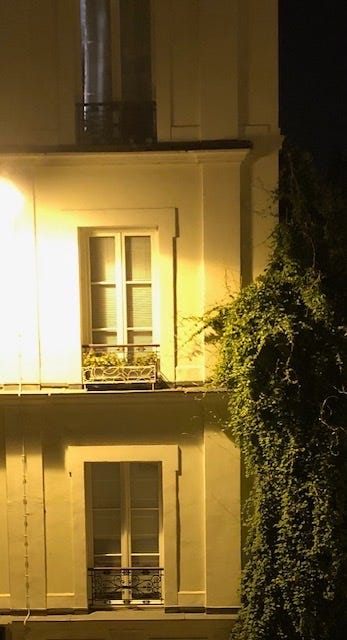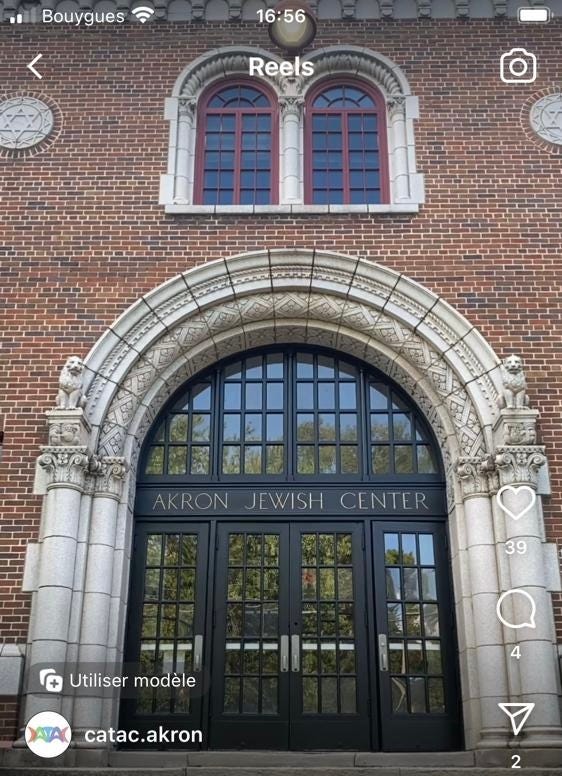The Broken World
Jim's Musings from Paris November 2023
When I was thinking how to describe the happenings of the last month, a fragment of Mary Oliver’s poem, “Invitation,” appeared in my Facebook feed. Succinct and oh so perfect, this bit of brilliance sums up my astonishment and anguish as images and reports from Gaza, Israel, Ukraine, Sudan, flooded my consciousness throughout the month of October.
it is a serious thing
just to be alive
on this fresh morning
in the broken world.
Robert Reich wrote recently in Substack about the preponderance of hate throughout the world right now. Everywhere we look, there is evidence of hatemongers sowing their special brand of discontent and blame. France is home to Europe’s largest Jewish population and largest Muslim population. The country is on high alert for terrorist attacks. I feel so often completely helpless when faced with the seriousness of being alive in today’s world.
We sheltered a friend from Macalester, who I had not seen in forty-some years. She secured the last seat on an El Al flight from Tel Aviv to Paris just five days after the Hamas massacre of Israelis on October 6. She had been living in Jerusalem for the past seven years, but the constant air raid sirens and frequent trips from her eighth floor apartment to the underground shelter were too much for her. She arrived in Paris exhausted and strained. The next day, after a meal of pasta and a quiet night’s sleep, she returned to the USA. Her stay in our home brought us in direct contact (in a small way) with the reality of this newest war.
And it is very confusing.
In Ukraine, the enemy is clear. But what is happening in Israel? I can’t believe that the enemy is the thousands of Palestinians, children and the elderly, that we see being bombarded and suffering from violent, tragic, loss and deprivation in Gaza. There must be another way for Israel and its allies to choke the evil that is the terrorist organization, Hamas—a via positiva, paved with what spiritual leader, Matthew Fox, calls compassion:
In short, we are capable of compassion and working out of our
commonality, our shared interdependence, our shared joys and our shared sorrows.
It is good news to hear that sermons on Fridays in mosques and on Saturdays in synagogues and hopefully on Sundays in churches speak to this bottom line of what it means to be human. And what it means to survive and thrive as humans and carry on as humans.
Compassion is the only way. War is obsolete—and so, so, so déjà vu.
A film review
I often have said that theatre is the place where we go to remember what it is to be human. If I extend my definition of “theatre” to include cinema, then we have in movie theatres right now an excellent experiment in recalling compassion, Martin Scorsese’s Killers of the Flower Moon. The film masterfully tells the story of the murders of Osage men and women, in the 1920’s and 30’s, in Oklahoma, after oil was discovered under the Osage reservation and the tribe members became extremely wealthy. The wealth, however, was controlled by the Bureau of Indian Affairs and, through sham marriages, murder, and other shady means, powerful white men were able to get control of some of the tribe members’ inherited “head rights.” I’m no fan of Leonardo Decaprio and I feel that he is especially out of his element in this film. His performance is heavy and without any inspiration or nuance. The character he plays is complex and full of contradictions. Dicaprio has no idea how to reveal the man’s darkness or play the paradox. His face remains frozen in a scowl throughout the movie. I think Scorsese tries valiantly to save the actor’s performance through pacing and editing but, in the end, Dicaprio just weighs the film down and keeps it from being all it could be. Nonetheless, the film sheds light on human greed and violence, reminding us how low we can go and providing a parallel vision of the need for compassion alongside the current 24 hour news cycle.
Making vibration in Paris
One small way that I’m trying to fight the hatred and feed the need for compassion in the world is by singing. I was invited to join two very different choirs here in Paris: Abadachoeur, a large acapella group, and Mélo’Men, a gay men’s chorus that has been established in Paris for 30 years. I thought I was going to have to choose one group over the other, but for the moment, I am trying to handle both of them. Mélo Men is a classic men’s choir, with a repertoire that ranges from medieval songs in Latin to Adèle. We are currently preparing a holiday concert with standards such as “Silent Night” and “Carol of the Bells” as well as an Italian carol and several Hanukkah songs. The acapella group performs primarily pop songs like “Uptown Funk,” “Fever,” and songs by The Weekend and Stromae. Both groups rehearse one evening a week for two to three hours. Mélo’Men also rehearses one weekend each month for eight hours and each group does a fall and a spring weekend retreat outside the city. It’s a big commitment and I’m hoping that once we start doing performances in the spring that I’m not going to be overwhelmed. I’ve never been in a choir before and I don’t read music all that well. For now, I’m just trying to memorize the songs.
My first rehearsal with Mélo’Men made a big impression on me. I realized that I had never been in a situation before where everyone in the room with me was gay. We were all pursuing excellence while engaged in a creative action. It was good. I could feel a defensive armour slowly melt away. I have often envied the certain swagger and confidence that many heterosexual men exude when they enter a space. I don’t think they are necessarily even conscious of it. It’s the confidence that comes from never having to hide or dissemble who you really are—never doubting that you belong where you are. For a few hours each week, I taste a little bit of that kind of security and aplomb.
The acapella group welcomes all genders and the ambiance is very different. However, most interaction remains within one’s vocal section: soprano, alto, tenor or bass. The director leads us through physical and vocal exercises and team building activities. His energy and enthusiasm creates a very disciplined and exciting rehearsal situation. We work for two hours with no break and the quality of the work evolves quickly. I enjoy the challenge and the strong element of collaborative interaction that this group demands.
And so I add a little positive vibration into the broken world. That’s the best I can do right now.
Some other things…
The Grotowski Institute in Poland is doing a fundraiser to offset the cost of some necessary repairs on Brzezinka, the rural workspace where Grotowski conducted much of his research during the Theatre of Participation and Theatre of Sources periods of his work. NWPL also has worked in Brzezinka several times and Jairo did two workshops there recently. Please give what you can.
Also, CATAC, the organization that Jairo and I founded in Akron, is holding a fundraiser. Click here for more information.






Mi piace molto il tuo modo di reagire con il canto e la condivisione nei cori agli orrori ai quali spesso assistiamo inerti. E’ difficile continuare ad agire ma dobbiamo farlo. Io continuo a fare teatro ed a lavorare con i ragazxi